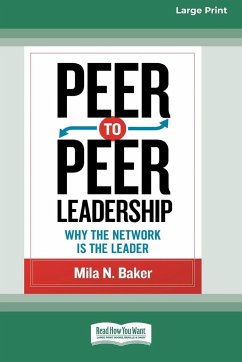Why is it that trust in leadership and the success of leaders seem to erode as we develop and refine more sophisticated models for leading, such as emotional intelligence, transformational leadership, and adaptive leadership? Mila Baker believes that most of today's leadership theories are old wines in new skins and still rely on the leader - follower hierarchy. Yet the idea of hierarchy is breaking down everywhere in society, from politics to religion to social relationships - and most particularly in computers and networking. Why should leadership be any different? Baker's inspiration is the peer - to - peer model of computing, which is also mirrored in social networking and crowdsource technologies. Baker shows that a network with ''equipotent'' nodes of power - think peer leaders - is infinitely more powerful than a ''client - server'' (i.e., leader - follower) network. Yet the typical organizational design still harkens back to the days of punch - card computers. By creating organizations with leaders at all levels, architects of peer - to - peer organizations can build flexibility, resiliency, and accountability. Baker still advocates the need for top - level executives and senior leaders but advises them to give up traditional notions of power and become focused on maintaining the health of the network rather than achieving personal leadership goals. Companies such as Gore and Herman Miller practice these principles and have achieved long - term success - Baker provides a structure to this approach that any organization can adapt.
Hinweis: Dieser Artikel kann nur an eine deutsche Lieferadresse ausgeliefert werden.
Hinweis: Dieser Artikel kann nur an eine deutsche Lieferadresse ausgeliefert werden.








